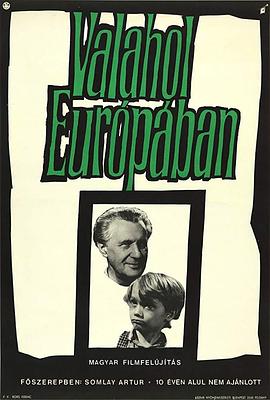简介
Somewhere in the remote region, the war ends. In the midst of ruined cities and houses in the streets, in rural hamlets, everywhere where people still live, are children who have lost their homes and parents. Abandoned, hungry, and in rags, defenseless and humiliated, they wander through the world. Hunger drives them. Little streams of orphans merge into a river which rushes forward and submerges everything in its path. The children do not know any feeling; they know only the world of their enemies. They fight, steal, struggle for a mouthful of food, and violence is merely a means to get it. A gang led by Cahoun finds a refuge in an abandoned castle and encounters an old composer who has voluntarily retired into solitude from a world of hatred, treason, and crime. How can they find a common ground, how can they become mutual friends The castle becomes their hiding place but possibly it will also be their first home which they may organize and must defend. But even for this, the price will be very high. To this simple story, the journalist, writer, poet, scriptwriter, movie director, and film theoretician Béla Balázs applied many years of experience. He and the director Géza Radványi created a work which opened a new postwar chapter in Hungarian film. Surprisingly, this film has not lost any of its impact over the years, especially on a profound philosophical level. That is to say, it is not merely a movie about war; it is not important in what location and in what period of time it takes place. It is a story outside of time about the joyless fate of children who pay dearly for the cruel war games of adults. At the time it was premiered, the movie was enthusiastically received by the critics. The main roles were taken by streetwise boys of a children's group who created their roles improvisationally in close contact with a few professional actors, and in the children's acting their own fresh experience of war's turmoil appears to be reflected. At the same time, their performance fits admirably into the mosaic of a very complex movie language. Balázs's influence revealed itself, above all, in the introductory sequences an air raid on an amusement park, seen in a montage of dramatic situations evoking the last spasms of war, where, undoubtedly, we discern the influence of classical Soviet cinematography. Shooting, the boy's escape, the locomotive's wheels, the shadows of soldiers with submachine guns, the sound of a whistle—the images are linked together in abrupt sequences in which varying shots and expressive sharp sounds are emphasized. A perfectly planned screenplay avoided all elements of sentimentality, time-worn stereotypes of wronged children, romanticism and cheap simplification. The authors succeeded in bridging the perilous dramatic abyss of the metamorphosis of a children's community. Their telling of the story (the scene of pillaging, the assault on the castle, etc) independently introduced some neorealist elements which, at that time, were being propagated in Italy by De Sica, Rossellini, and other film artists. The rebukes of contemporary critics, who called attention to formalism for its own sake have been forgotten. The masterly art of cameraman Barnabás Hegyi gives vitality to the poetic images. His angle shots of the children, his composition of scenes in the castle interior, are a living document of the times, and underline the atmosphere and the characters of the protagonists. The success of the picture was also enhanced by the musical art of composer Dénes Buday who, in tense situations, inserted the theme of the Marseilaise into the movie's structure, as a motive of community unification, as an expression of friendship and the possibility of understanding. Valahol Europaban is the first significant postwar Hungarian film. It originated in a relaxed atmosphere, replete with joy and euphoria, and it includes these elements in order to demonstrate the strength of humanism, tolerance, and friendship. It represents a general condemnation of war anywhere in the world, in any form.
猜你喜欢
-
HD
蛇鹤八步国语
主演:成龙,苗可秀,金刚,金正兰,李永国,刘雅英,苗天,李文泰 -
HD
七人乐队
主演:洪天明,洪金宝,吴镇宇,马菀迎,余香凝,吴澋滔,元华,林恺铃,伍咏诗,胡子彤,徐浩昌,任达华,龚慈恩,林宇轩,张达明,张锦程,林雪,刘国昌,徐克,许鞍华 -
HD
单身星球:爱的希腊大冒险
主演: -
TCV3
捕风追影
主演:成龙,张子枫,梁家辉,此沙,文俊辉,周政杰,王紫逸,郎月婷,林秋楠,王振威,李哲坤 -
HD
亲爱的陌生人2025
主演:西岛秀俊,桂纶镁,雅南,克里斯托弗·曼恩,詹姆斯·朱,拉内特·塔谢尔,王九礼,Meghan O'Leary-Clark Meghan O'Leary-Clark -
HD
代价2024
主演:Kaitlyn Chalmers-Rizzato,Stephen Kalyn,Willow Astbury,Clint Russell -
HD
雪之花
主演:松坂桃李,芳根京子,役所广司,吉冈秀隆,三浦贵大,宇野祥平,坂东龙汰 -
HD
神偷谍影国语
主演:金城武,陈小春,杨采妮,李绮虹,王合喜,方中信 -
HD
星月童话国语
主演:张国荣,常盘贵子,樫野有香,杨紫琼,高捷,惠天赐,廖启智,黄家诺,李香琴 -
HD
伴我闯天涯国语
主演:周润发,钟楚红,张耀扬,秦沛,谷峰,刘江,黄光亮,吴志雄,金燕玲,尹扬明 -
HD
冲上云霄国语
主演:古天乐,郑秀文,吴镇宇,张智霖,佘诗曼,郭采洁,朱璇,刘俊孝,马国明,江美仪,恭硕良,马鑫,廖京生 -
HD
东邪西毒国语
主演:张国荣,林青霞,梁朝伟,张学友,张曼玉,刘嘉玲,梁家辉,杨采妮,邹兆龙

